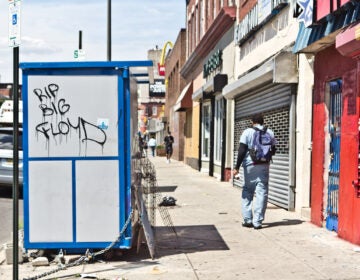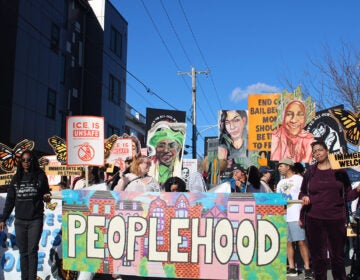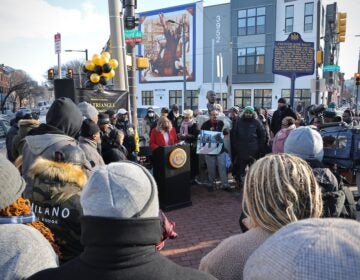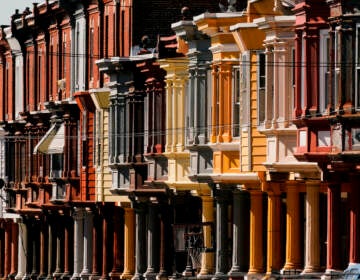Coming home to West Philadelphia without survivor’s guilt
Writer Kyle V. Hiller left West Philadelphia, where he was raised, to attend college. His 2020 return was a homecoming he never could have anticipated.
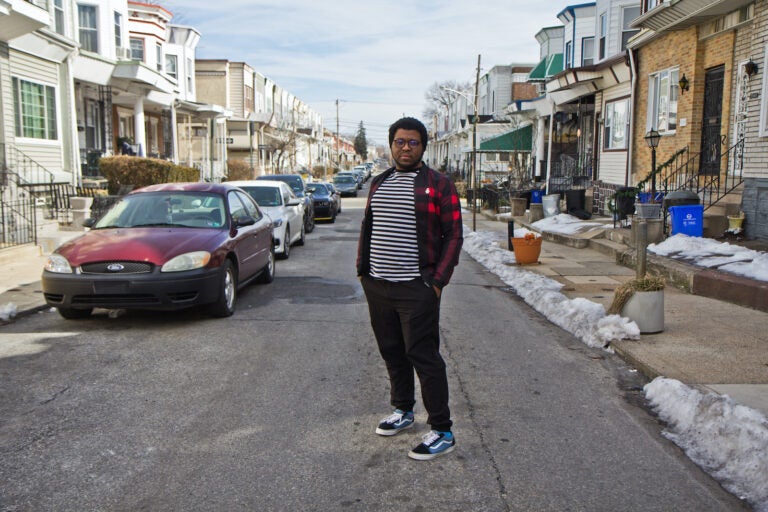
Kyle Hiller outside his home in West Philadelphia. (Kimberly Paynter/WHYY)
I was born and raised in West Philadelphia. I lived in the Cobbs Creek section, a block away from where Questlove grew up. Police bombed the MOVE compound the year before I was born, only a few streets down from where my family lived. I’ve long fielded Fresh Prince of Bel-Air and Boyz II Men references from outsiders. For a long time, I resisted associating myself with this neighborhood.
But you are what you resist. For a while, this was confusing.
Many residents in Cobbs Creek and other underprivileged neighborhoods don’t leave where they come from. Travel is expensive — and I’m not saying just hopping on a plane or train to somewhere hours away. Finding the fare to ride the 42 trolley or the El and head downtown can be a hardship. Sometimes, I had to walk back from Center City because I didn’t have the $2 to get back home on SEPTA. I was upset at this. I blamed myself for my shortcomings. But when opportunities popped up and extra cash found my pockets, I was perforated with survivor’s guilt.
Moving away from Cobbs Creek only happened because I didn’t have a choice — forced out of the house I was renting with friends with hardly any notice. College debt, not a dime in savings, and still trying to make sense of where I could fit in personally and professionally, I picked up the scattered pieces in a totally different side of town in South Philadelphia. For five years, I was homesick. And then, 2020 happened.
In a year scourged by a global pandemic, defining home has become imperative. Quarantine forced us to stay in our homes. Many have resisted or rebelled. Some joked about how this was an introvert’s dream. As someone who’s been working from home for two years now, there are days when I forget what’s happening outside. Lost in my bubble, overworked and emotionally displaced, I’m better about it now, but there were many times when I had to turn back around to my apartment to retrieve a mask because I’d forgotten to put one on. In the summer, I felt compromised in my tiny studio apartment. I’d outgrown the space not only physically, but spiritually. I vacated on a pseudo-sabbatical to stay with a friend for two months in Nashville, Tennessee, where I contemplated over dozens of hours in her front yard what my responsibility was to Philadelphia as a Black journalist. Something as scary as the global pandemic itself was happening back in West Philly. I had to do something about it.
Guilt or powerlessness?
When George Floyd was murdered by police, America erupted — and so did the blocks where I spent my childhood. Thousands hit the streets. When the social unrest roused West Philly on May 31, the narrative grew more harrowing, especially along 52nd Street. Sirens and helicopters hovered loud. Police officers with riot gear marched and formed phalanxes. SWAT officers tossed tear gas and fired pepper spray and rubber bullets at protesters and residents. Incredulously, I watched the footage of police tanks rolling down the street where I used to walk to school at West Catholic.
Then, it happened again.
Walter Wallace Jr. was shot and killed a week before my move-in day to my new West Philly home, which is minutes away from where it happened. I watched it all unfold from my South Philly home, immobilized by heartbreak and anger. In the background of photos of the subsequent protests, you can see the house I grew up in. The death of Wallace — a Black father and son killed while family members shouted alerts about his mental status — had become international news. In the midst of the most important election of our lifetimes, this was homecoming: an increasingly forsaken neighborhood wrought with unrest. I was wiped out with a familiar sense of hopelessness and powerlessness. I’d come to realize that it wasn’t guilt that I had been experiencing about leaving home. I felt powerless. That feeling was a symptom of systemic oppression.
Two years after my own father died, Obama ran for president. He promised hope during a rally held on 52nd Street. Twelve years later, those aspirations remain unfulfilled, and it shows. When I was moving back to West Philly in the fall, police barricades closed off neighborhood streets to protect the18th District Police Station ahead of the 2020 presidential election. The barricades have been taken down but a question lingers heavy in the air: What’s next for West Philadelphia and what’s at stake for its residents? The personal question still burns embers within me. What is my responsibility towards the neighborhood, the city, and its residents?
I needed time away from home to recognize that the self-guilt and powerlessness have come out of a void. I lacked the resources regularly provided to more privileged neighborhoods and communities. Without time away to cut through misplaced reservations, I would’ve become more and more septic over time.
I think a lot about the last time we’ll ever do the things we do. You don’t always know when it’s the last time you’ll play a certain album or the last time you’ll see a loved one. One of the fondest memories of the time I’ve had with my father was in the summer of 2001, in the West Philly home I grew up in, watching the NBA Finals when the Sixers played the Lakers. That was the last basketball I’d watch with him, and one of the last times I would see him.
It wasn’t until I lost my father that I realized I went away because I didn’t trust that home was home. It wasn’t until then that I understood the meaning of coming home and connecting with it. Now I know, and now begins the work of being here, at home.

Subscribe to PlanPhilly
WHYY is your source for fact-based, in-depth journalism and information. As a nonprofit organization, we rely on financial support from readers like you. Please give today.



